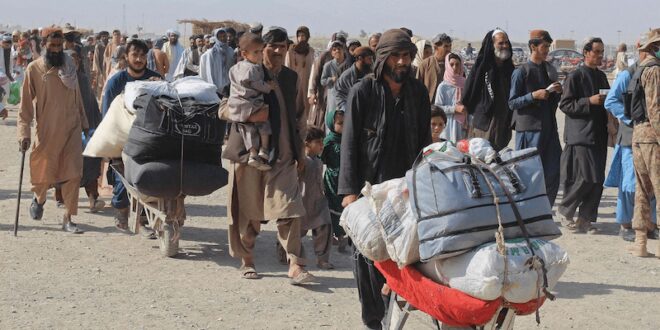Recently, a flight from Germany departed with 28 Afghan asylum seekers on board, marking a new wave of deportations that targets individuals with criminal records. This action is part of Germany’s broader initiative to address growing security concerns within its borders, especially following recent incidents involving violent acts committed by asylum seekers. However, this decision has sparked intense debate, both domestically and internationally, especially considering Germany’s upcoming state elections.
The decision to deport these Afghans has been framed by German authorities as a necessary measure to safeguard the country’s security and maintain public order. By focusing on individuals with criminal records, Germany aims to alleviate the fears and concerns of its citizens while demonstrating a firm stance against illegal activities linked to asylum seekers. This move, however, has generated mixed reactions, with some viewing it as a legitimate response to security threats, while others criticize it as a potentially discriminatory action against a vulnerable population.
On the other hand, Pakistan’s approach to Afghan refugees offers a stark contrast to Germany’s current policy. For over four decades, Pakistan has provided shelter to more than four million Afghan refugees, a considerable number of whom have been found to have ties to criminal or terrorist activities. Despite facing its own economic and security challenges, Pakistan has extended extraordinary hospitality to these refugees, allowing them to integrate and live within its society. The country’s policy has long been regarded as one of the most open and compassionate towards refugees in the region, maintaining a delicate balance between its own national interests and its humanitarian obligations.
However, after 40 years of hosting Afghan refugees, Pakistan has recently decided to deport only those immigrants who are illegally residing within its borders. This policy shift is aimed at regulating the population while maintaining the dignity and respect of those being deported. The decision comes amidst Pakistan’s increasing socio-economic pressures and security concerns, as many of the illegal immigrants have been implicated in terrorist acts. Thus, Pakistan’s new policy represents a careful balancing act between upholding its humanitarian responsibilities and ensuring legal order and security within its borders.
The divergent approaches of Germany and Pakistan towards Afghan asylum seekers highlight a broader debate about immigration, security, and humanitarian responsibilities. Germany’s actions are being taken within a politically charged environment, where debates on immigration and security are intensifying as the state elections approach. Meanwhile, Pakistan’s policies reflect a pragmatic response to its own unique set of challenges, shaped by decades of hosting refugees and managing the associated economic and security burdens.
What is notable, however, is the disparity in the international reaction to these two countries’ policies. While Germany’s decision to deport Afghan asylum seekers has largely been met with silence or muted criticism, Pakistan’s decision to regulate its refugee population has sparked criticism from some quarters. Critics, including certain Afghan groups, like-minded Indian commentators, and a few self-proclaimed human rights advocates, have targeted Pakistan for its recent policy shift. These critics often overlook the fact that Pakistan has been an unparalleled host for Afghan refugees for decades, providing a safe haven and opportunities for integration into Pakistani society.
This difference in reactions highlights a perceived double standard in the international community’s approach to refugee policies. While Germany’s deportations are viewed through the lens of national security and legal necessity, Pakistan’s actions are scrutinized more harshly, despite the country’s long-standing record of hospitality and support for Afghan refugees. This discrepancy suggests a broader, perhaps biased narrative in which Pakistan’s efforts to maintain its security and sovereignty are unfairly criticized, while similar actions by Western countries are accepted or go largely unnoticed.
Pakistan’s decision to deport illegal immigrants should be seen as a measured response to its current socio-economic and security conditions. It reflects the country’s attempt to balance its humanitarian responsibilities with the need to maintain law and order within its borders. Pakistan’s new policy is not a blanket rejection of Afghan refugees but rather a focused effort to regulate those who have entered illegally, many of whom have been found involved in criminal activities. The policy aims to ensure that Pakistan remains a safe and stable country while continuing to fulfill its obligations to those genuinely in need of asylum.
Meanwhile, Germany’s recent deportation of 28 Afghan asylum seekers is likely to be a contentious topic in the upcoming state elections. The move could influence voter sentiment, particularly among those concerned about security and immigration. As the political discourse in Germany continues to evolve, the deportations could either be framed as a necessary measure for maintaining security or criticized as an unjust targeting of vulnerable populations.
In conclusion, the contrasting approaches of Germany and Pakistan towards Afghan refugees highlight the complex interplay between security concerns, humanitarian responsibilities, and domestic political dynamics. While Germany’s actions are shaped by immediate security concerns and political considerations, Pakistan’s approach reflects a long-term commitment to balancing compassion with its socio-economic realities. It is essential to recognize these different contexts and consider them when evaluating each country’s policies on Afghan refugees. Rather than criticizing Pakistan’s recent decision, it is crucial to acknowledge the country’s longstanding efforts to provide refuge and support to millions of Afghans over the past four decades.
 Eurasia Press & News
Eurasia Press & News




